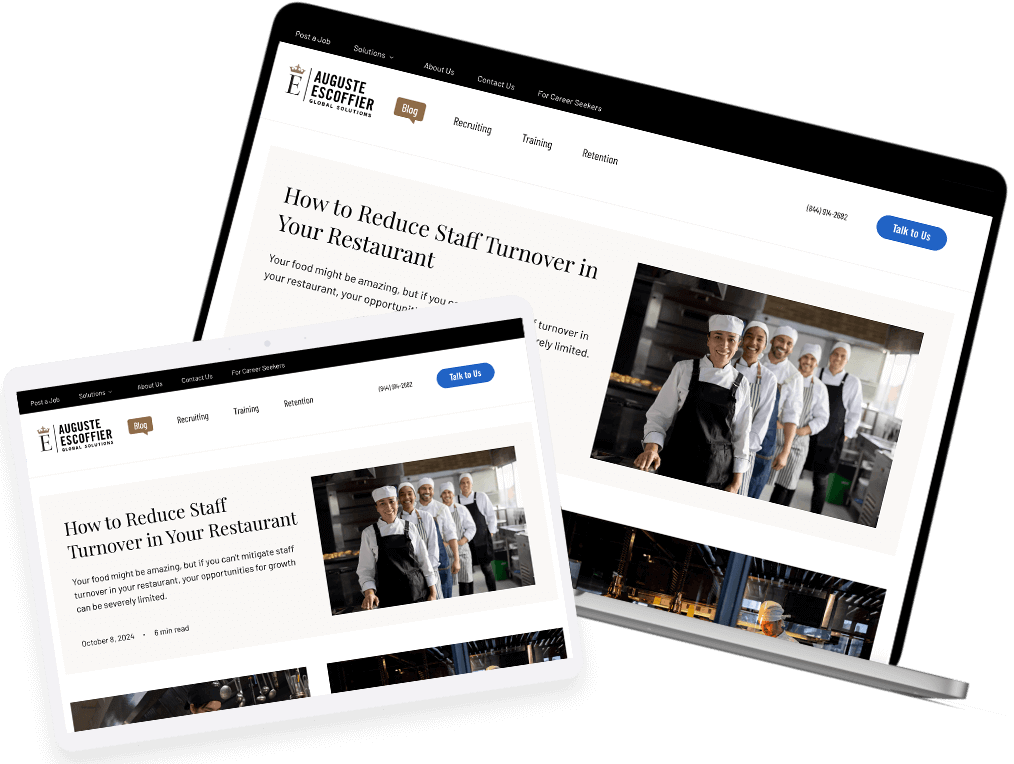
How to Hire Restaurant Employees Who Want a Career (Not Just a Job)
If you’re a restaurant manager, you know how costly turnover can be. Here are some tips for hiring long-term employees you can count on.
Any employer’s dream is to find employees who are as dedicated and enthusiastic about the business and its mission as the owner. Dedicated and passionate employees bring significant value to a company, improving its bottom line and workplace culture. Best of all—they tend to stay a long time, forging a career instead of a temporary gig.
Of course, this might sound like a pipe dream for many restaurant owners. The accommodation and food service industry consistently has the highest quit rate of any industry, regularly coming in above 4.5 percent since July 2021, according to the U.S. Chamber of Commerce. The quit rate, or quits rate, refers to the number of employees who voluntarily leave their jobs as a percentage of total employment. Although hiring rates have outpaced quit rates, most employers don’t want the costs and headaches that turnover entails.
But what if you could reduce that figure and find employees who are interested in a career, not just a transient means to pay the bills? This single adjustment to your business could produce meaningful returns and make a serious difference in an industry where profit margins hover around five percent.
By taking simple steps, restaurant owners and hiring managers can identify candidates who want to cook professionally, not just pick up shift work.
Rather Than Cutting Labor Costs, Consider Trimming Your Turnover
Employee turnover comes at a high cost.
The National Restaurant Association estimates that restaurants lose up to $150,000 a year in staff turnover. The average employer spends upwards of $2,000 to recruit and train a new restaurant employee, and the cost jumps up to $15,000 if that employee is in a management position. Those figures don’t even take into account intangibles like staff morale, time and energy spent recruiting and training new employees, and your restaurant’s reputation among job seekers and customers, who notice things like the frequency of new faces.
With that in mind, it might make sense to evaluate whether you’re focusing on the right numbers in your budget. Although many employers seek to keep their labor costs as low as possible—i.e. paying employees as little as they can—that can negatively affect turnover, particularly in the restaurant industry, where low-paying jobs and a reliance on tips are the norm.
What might it do for your restaurant’s employee retention (plus morale and loyalty) if you paid a higher wage than the competition? That’s more than a feel-good approach; the math might tilt in your favor when you compare a higher wage to the expenses related to turnover.
How You Can Attract, Hire, and Retain Exceptional Talent
Finding the right-fit employees begins when you advertise and interview for a job. When you lay the right groundwork, it can be easier for everything else to fall into place.
Here are some tips for finding and hiring the right talent for your restaurant:
1. List Detailed Online Job Opportunities to Filter Out the Best Candidates
Keep in mind that an accurate description of the opportunity can be an essential step in finding the right candidates. Be as specific as possible in your job ad, and post it to the best jobs boards, like EConnect from Escoffier Global. List the specifics of the job and your desired skills, but be careful that you aren’t so specific that candidates are discouraged from applying.
Taking time to outline the details of the role thoroughly will help eliminate a large portion of candidates who are looking for something temporary or low-effort.
2. Show Candidates What’s In It For Them Long-Term
In addition to a clear and succinct job description, your post can appeal to career-minded employees by describing the perks of landing employment with you and making it clear they won’t be stagnant in their roles.
For example, imagine how a mention of a Work & Learn benefit, a flexible degree and diploma benefit that grants employees access to a specialized scholarship from Auguste Escoffier School of Culinary Arts, might make your post leap off the screen for motivated candidates.
3. Be Mindful of How Candidates Present Themselves During Interviews
Does it matter how candidates show up to interviews? You bet it does. Don’t ignore red flags like showing up late, being underdressed, or not presenting a resume.
Candidates should have excellent hygiene and the ability to communicate clearly. Keep an ear out for the use of common culinary terms or general knowledge of the kitchen or restaurant environment.
Punctuality and preparedness, such as arriving on time with necessary documents like food handling licenses, demonstrate reliability and organization, key in a fast-paced kitchen. Observing behavioral indicators, such as how candidates discuss past colleagues or respond to situational questions, provides insight into their work ethic and team compatibility. Non-verbal cues like eye contact, body language, and overall demeanor offer clues about a candidate’s attitude, confidence and stress management skills.
This focused approach in evaluating candidates ensures the selection of those who are not only technically skilled but also embody the professionalism and soft skills vital in the culinary world.

4. Ask the Right Questions and Conduct Skill Tests
You can learn a lot in a short period with targeted questions about a candidate’s knowledge and experience working in a high-stress, fast-paced restaurant environment.
For example, if hiring a cook, you might ask how they’d set up their workstation. If they can demonstrate a knowledge of mise en place, that’s a good indicator they know their way around a kitchen. Incorporate behavioral interview questions to gauge candidates’ stress management and teamwork skills, such as asking about their experiences in high-pressure situations. For example, you can ask hypotheticals, like how they would handle an unsatisfied or complaining customer during a lunch rush.
This line of questioning extends to a prospective employee’s future goals, as well. Candidates who can describe a clear vision of what they want in their future are most likely candidates worth considering.
5. Move Quickly to Hire Qualified Candidates
Don’t jump the gun . . . or lose a great candidate through failure to follow up! Due to its high turnover rate, the restaurant industry can be notorious for needing immediate help and making quick hiring decisions.
To the extent that you are able, try to give yourself as much time as possible to interview a variety of candidates at least once and bring them back for skills testing if needed. That said, don’t hesitate for long when you come across a candidate you find especially promising. Trust your instincts and ability to spot a good hire, and act fast on a potentially good fit so they don’t slip through your fingers and wind up elsewhere.
What to Look For in High-Quality Candidates
As you scroll through resumes and portfolios, it can be helpful to be clear in your vision of the ideal employee. If you want to hire candidates who are more likely to build a career with you and add value to your restaurant, you want to be mindful of some of the attributes that those types of candidates typically possess.
Industry Experience Counts, but Training is Always Critical
Seeing a history of similar positions—with lengthy periods of employment listed—is an excellent indicator that a candidate may have what it takes to fill your vacancy. However, if the right person is open to training, and you have the infrastructure in place to train them properly, you can potentially find a long-term, high-quality hire.
Consider the relevance of past work to the job you’re hiring for, but be prepared to look beyond it if the person feels like a good cultural fit. If you’re hiring someone who needs expertise managing a kitchen staff of 40-plus, and you interview someone who’s friendly, personable, and still has a good baseline of experience (let’s say they’ve worked their entire careers managing a small front desk team in a boutique hotel) they may be worth hiring and training despite minor resume gaps. If you have that training ready to go, the process can go very smoothly.
Finally, remember that internships and externships certainly count, especially for junior-level positions. These jobs—paid or unpaid—still show real-world experience cooking professionally in a foodservice establishment. Escoffier Global can help employers across the country access externs and graduates from Auguste Escoffier School of Culinary Arts, the largest culinary school brand in the United States*, to meet immediate and long-term workforce needs across a variety of interests and experience levels. These students will have completed classwork as well as spent time in professional kitchens, potentially reducing training time and demonstrating a career-minded focus.
*Based on comparable student population data for Austin, Texas, campus and Boulder, Colorado, campus as currently reported in Integrated Postsecondary Education Data System (IPEDS).
Sample Interview Questions
Here’s a list of interview questions that cover the basics and also might help you identify career-minded applicants.
- Can you tell me about your previous experience in the restaurant industry?
- Why are you interested in working at our restaurant?
- Describe a time when you had to work under pressure. How did you manage it?
- What do you think are the key qualities of a successful team member in a restaurant?
- Are you familiar with our menu? What is your favorite item and why?
- What do you think sets our restaurant apart from competitors?
- What do you know about food safety and hygiene practices?
- How do you prioritize tasks during a busy shift?
- What motivates you to perform well in your job?
- How do you approach learning new skills or tasks?
- Are there any aspects of restaurant work you find particularly challenging?
- Where do you see yourself in the next few years? Do you have any long-term career goals in the hospitality industry?
Additional Training Indicates a Career-Focused Candidate
So, what if a candidate hasn’t pursued higher education but demonstrates a history of exploring other training opportunities? This can also be a good sign.
Look for other types of training programs on a resume, even the more informal ones like individual online courses. Successful completion of these courses shows an interested, career-oriented candidate who wants to sharpen their skills.
Once You’ve Hired Them, Keep Them. Tips for Employee Retention.
You’ve crafted a great job listing, conducted spot-on interviews with focused questions, and you’ve hired someone you believe will make a great addition to your restaurant. Now what?
Your hiring process doesn’t end at the job offer or even on the first day. It’s important to establish a system for retaining those stellar employees you want to keep around. Here are some ideas to boost employee retention.
Onboarding and Training for Career Development
You’ve set the tone during the hiring process, so keep it going. Rather than tossing a new hire into the fire, be sure to create a detailed onboarding process that describes how the job works and expectations.
The time you spend up-front in creating a comprehensive onboarding process can pay dividends later, with shorter training times and higher job satisfaction. This structure can include a detailed manual and training plan with clear descriptions of various roles and expectations; orderly paperwork; an orientation period during which they meet other employees and tour the restaurant; regular check-ins along the way, especially early on; and pairing them with a mentor, or more experienced staff member, who can guide them.
You can also provide opportunities for employees to continue developing their skills through programs like ESource. ESource is a learning platform through Escoffier Global that includes quick, on-the-spot training and deeper, assessed learning. Your employees can explore new techniques or brush up on existing ones, or dive deeper into self-directed micro-courses and comprehensive courses.

Create a Career Path in Your Restaurant
Whether you’re hiring a new busboy or a sous chef, it can be to your benefit to show them how they can advance. Make it clear what their next steps might be and what they need to do to get there.
You went out of your way to hire employees with goals and dreams, so once they land in your restaurant, you can follow through by showing them how they can progress in their career. This can be included in materials you distribute, like an employee handbook that describes roles and responsibilities, as well as communicated verbally. This can also help minimize their desire to look elsewhere when they feel they’ve outgrown their current position.
Provide Mentorship, Teamwork, and Collaboration
A positive workplace culture can add to your restaurant’s bottom line. Encourage teamwork and collaboration in your restaurant by making everyone’s roles clear, and communicating the importance of each individual.
You can also incorporate ways to recognize and reward employees in meaningful ways, from public recognition of their value to career advancement. Go beyond a company mug to something your employees will legitimately appreciate. Cash and bonuses would obviously top their list, but even if you can’t manage those, you can look for ways to reward productivity and encourage loyalty. Employees are more likely to repeat behaviors that are positively reinforced by their superior such as teamwork, punctuality, organization.
Examples of this might be an Employee of the Month program or weekly shout outs of wins during team meetings, incentives to earn paid time off, and other personalized experiences.
Exceptional Talent Can Produce Excellent Results
Don’t let industry turnover hinder your restaurant’s success. Focus on finding candidates who are the right fit for the role and who demonstrate a willingness to grow and advance. Train them properly, and then follow through by rewarding those who demonstrate excellence.
Escoffier Global offers customized training to help you retain and develop your current employees, as well as scholarships for qualified employees wanting to earn a culinary diploma or degree. We can also help connect food industry employers with a diverse pool of talent, including student externs and alumni from Auguste Escoffier School of Culinary Arts ready to use their knowledge and skills.
Get in touch with our team for more information on partnering with Escoffier and building your culinary talent pipeline.


